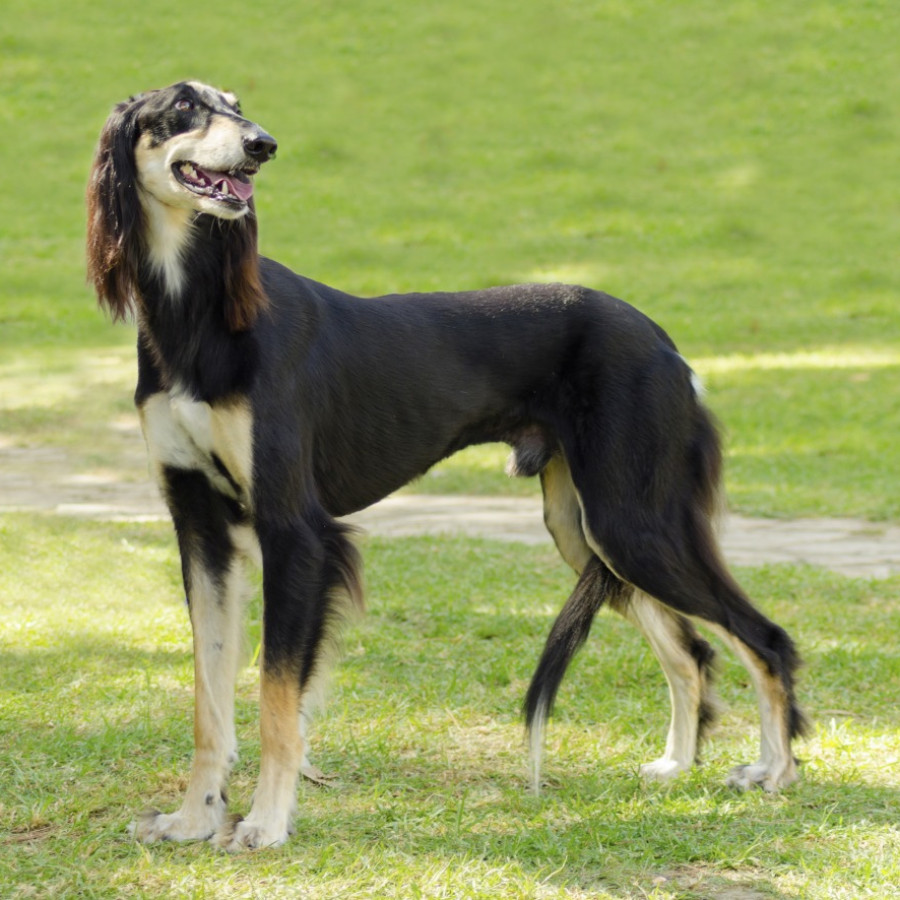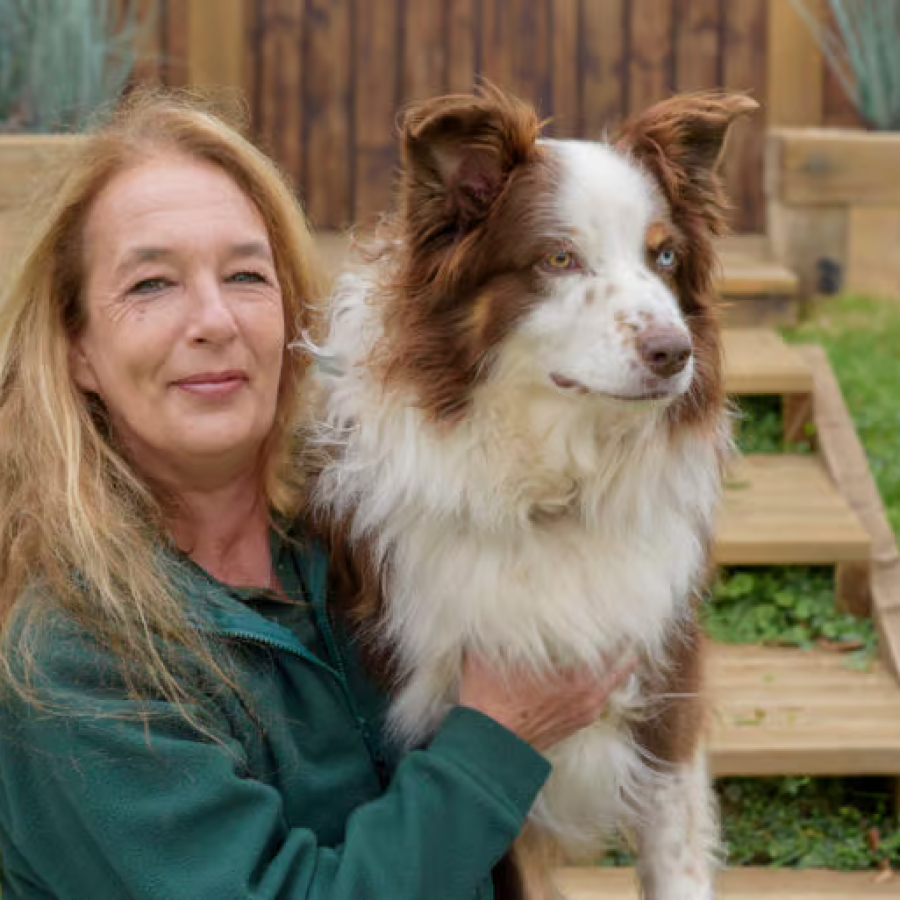
Saluki Dog Breed
Salukis are sophisticated, sensitive and sweet-natured souls. They love long runs and loafing on the couch.

Salukis are sophisticated, sensitive and sweet-natured souls. They love long runs and loafing on the couch.
Salukis are elegant, athletic, and independent. Although fond of their personal space and sometimes reserved around strangers, Salukis are affectionate towards their family. They’re best suited to quieter households, with access to secure gardens/enclosed outdoor spaces so they can satisfy their high prey drive with chasing, running, and off-lead exercise.
Salukis are a unique mix of affection and independence. They’re very sweet with their family, without being overly clingy or insisting on constant snuggles. They express love in more subtle ways, like spending time with you or faithfully following you around the house. They thrive on companionship and dislike chaotic environments, so prefer bonding with a similarly gentle soul in a peaceful home.
Although they enjoy spending most of their time lounging inside, their athleticism shines outdoors. These endurance runners need regular opportunity to stretch their legs. As sighthounds they were bred to hunt using sight and speed (rather than relying on smell), and these roots make their chase instinct very strong! Salukis are very smart and learn quickly if properly motivated. Involve toys and treats to make their training fun and effective. Without mental or physical exercise, they may resort to disruptive behaviours or sudden zoomies around the house!
Disclaimer
While these breed traits give a general idea of what to expect from a specific type of dog, it's important to remember that every dog is unique. Just like people, each dog comes with their own distinct personality, quirks, and characteristics!

Salukis’ gentle and patient personalities make them great additions to calm, peaceful family homes. They prefer a household without rough play, loud noises, or lots of running around. These sensitive souls definitely prefer the quiet life. They do best with older children who respect their space and let them sprawl out in peace. Like all dogs, it’s important to actively supervise Salukis around children to prevent any accidents or inappropriate interactions.
Salukis are typically sweet and affectionate dogs, but aren’t overly needy. They form strong bonds with their family and enjoy being near their humans. Salukis prefer gentle companionship over constant fuss, attention, and affection. They might lean against you, follow you from room to room, or rest their head on your lap, but they also appreciate their alone time.
Salukis have a playful side, but their idea of fun is different from more energetic and boisterous breeds. They enjoy zooming around in a secure field, playing chase with other dogs, and occasionally engaging in gentle games with their owners. They’re not fetch-obsessed but will enjoy activities that let them use their speed and agility, like playing with a flirt pole.
No—Salukis are typically very quiet dogs. They rarely bark unless they’re startled or very excited. However, they may occasionally "talk" with whines or dramatic sighs to get your attention. If they do start barking excessively it’s usually a sign of boredom or frustration, so that’s your cue to get them out for their daily walk!
Without proper training, socialisation, exercise, and mental stimulation, all dogs can develop behavioural issues.
Salukis have strong prey drives and chase instincts, meaning recall training can be challenging. They’re likely to be distracted by the presence of scents or small animals, so it’s best to keep them on a long-lead or only let them off lead in a secure area (unless you’ve built a solid recall). Remember, Salukis respond poorly to harsh training methods and need patient, reward-based training.
Occasionally aloof with strangers, Salukis can take time warming to new people. They’re likely to prefer relaxing at home rather than going to the pub garden or cafe with you.
Salukis may develop destructive behaviour or escape-artist tendencies if under-stimulated. Make sure they have fun ways to get physical and mental exercise each day, and check that your garden is secure with at least six-foot tall fencing, to minimise these risks.
Salukis need homes with space to run and a secure garden for zoomies. They can adapt to apartment living if they get enough outdoor exercise, but they much prefer having easy access to open spaces and living in more rural areas.
They thrive in quiet, low stress environments and do best with families who understand their sensitive nature. Generally, they prefer living with adults or older children who can read their body language and give them space when needed.
They often thrive living with dogs, especially fellow sighthounds who understand their personalities. However, pets like rabbits, cats, or chickens are likely to trigger their prey drive. Small pets need to be securely housed, well out of the way, and cats are a no-go unless you carefully socialise your Saluki with them from a very young age. Even then, your Saluki will likely chase any cats they see on their walks!
Salukis need at least one to two hours of daily exercise, including a chance to sprint in a secure area to properly stretch their long legs. Bred for endurance and speed, they can run for 10 - 15 miles at over 35mph before shifting gears to a blistering 40mph when pursuing their prey. So it’s safe to say, they love running!
Salukis also enjoy long, relaxed walks, with lots of sniffing to help them unwind. Mental stimulation is equally important—training sessions, scent games, and problem-solving activities help keep their minds engaged. If not given enough physical and mental exercise, they may become restless, anxious, or destructive.
Salukis are very intelligent and fairly independent, having been bred to work without much input from humans. This can make training challenging but they’ll learn quickly if they understand the benefit (treats and praises!) of training sessions.
All dogs require reward-based training and socialisation to learn basic behaviours, as well as how to interact with other dogs, animals, and people. Without this, they can develop anxiety or rude behaviour, which will need extra time and training to correct when they’re older. As dogs mature, they go through a range of life stages that can change their behaviour and require you to focus on certain aspects of training. We can help you with this through our free behaviour helpline.
Common behavioural issues to watch for include:
• Poor recall due to prey drive
• Aloofness with strangers
• Destructive behaviour if bored or anxious
• Sensitivity to harsh training
• Escape attempts if given the chance!
Salukis come in two coat varieties:
• Smooth, meaning short-haired
• Feathered, meaning they have long hair on their ears, tail, and the back of their legs. This is the better-known variety
Salukis have short, fine coats that require minimal grooming. A weekly brush with a rubber comb keeps their coat sleek and removes dirt and dead hair. If your Saluki has longer feathered locks, you’ll also need a slicker brush to comb through any knots to prevent tangles and matts.
Their thin skin is prone to cuts and scrapes, so regular checks are important. Due to their low body fat, they’ll need a coat and/or jumper in winter if you live in a colder climate.
Regular baths, nail trimming, ear cleaning, and dental care are also important for your dog’s overall well-being. This can be done at home if you train your dog to enjoy grooming from the start.
Keeping your dog healthy involves regular vet check-ups and vaccinations, a balanced and complete diet, regular exercise, and maintaining a healthy weight. This everyday care is crucial to preventing common health issues and reducing the impact of any health issues your dog already has.
Common health conditions in Salukis include:
• Heart conditions (e.g. dilated cardiomyopathy)
• Bloat
• Haemangiosarcoma – malignant tumour of the lining of the blood vessels
• Hypothyroidism – a condition in which there’s a decrease in thyroid hormone production
• Hip dysplasia
With good care, regular vet visits, and a healthy lifestyle, many of these risks can be minimised, ensuring your Saluki lives a long and happy life.
I need space to sprint, daily walks, and time to stretch my legs—skip my exercise, and I’ll get creative with my energy indoors!
My brain needs challenges too! Give me scent games, training sessions, and things to investigate, or I’ll make up my own fun...
Training me takes patience and rewards. I’m smart, but I don’t do pointless tricks. Make it worth my while and I’ll impress you!
Ongoing costs:
• Food: £40–£80 per month
• Insurance: £20–£50 per month
• Vet bills: £200–£500 annually
• Grooming supplies: £50–£100 annually
• Dog walkers/boarding fees: £10–£25 per walk or £25–£50 per night
• Grooming supplies: £50–£100 annually
• Dog walkers/boarding fees: £10–£25 per walk or £25–£50 per night
Take our quiz to discover which breed is right for you
Take our quizPlease call our pet support line on 0300 303 9333 (7 days a week – 8.30am - 4pm)
